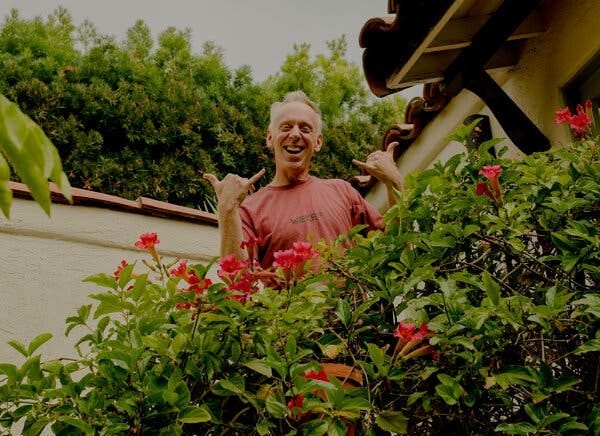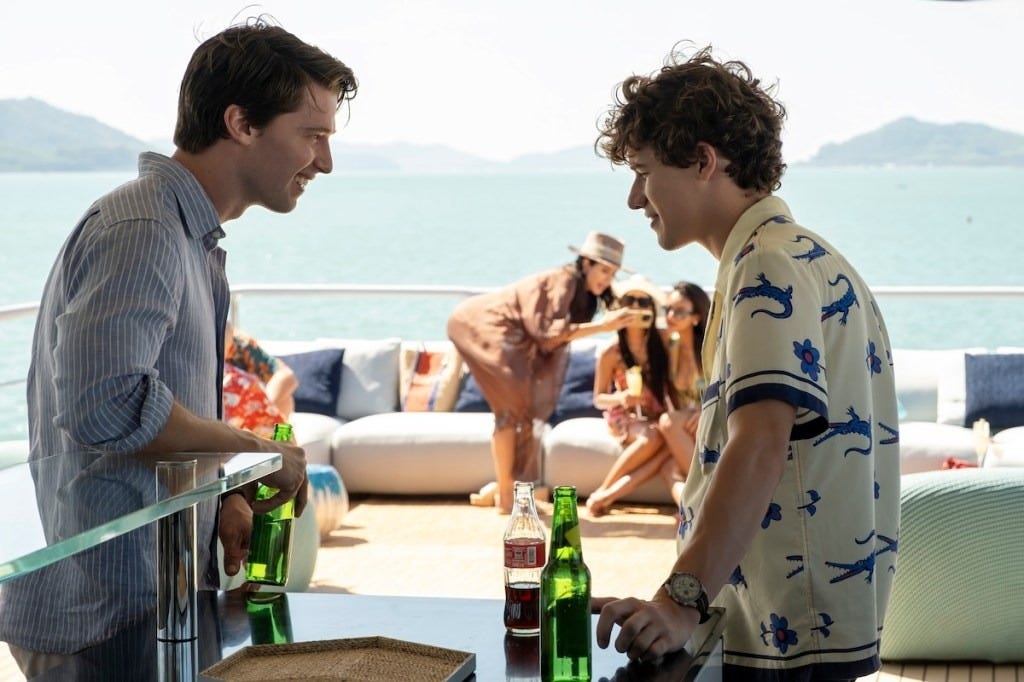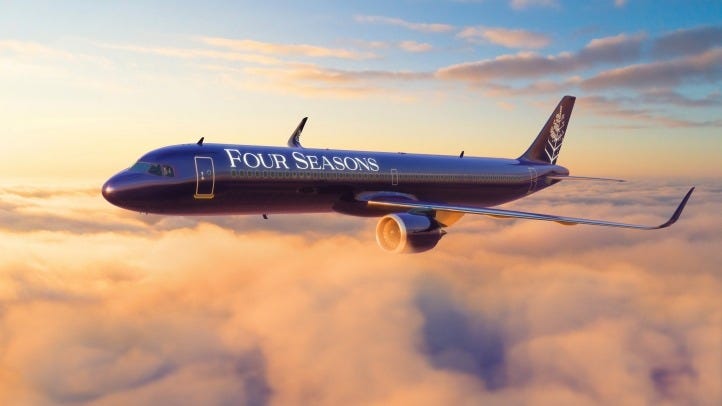The White Lotus S3 has an Asian girl problem
Even as White makes pointed critiques of appropriation and exploitation, he flattens Thailand into mere Orientalist tropes.
Season One of The White Lotus premiered the day before I started my job at HBO Max. Immediately, the show was all anyone would talk about at the office. I caught up to its weekly releases, hoping that by watching, I could get the hang of the content we were supposed to be making.
Despite the buzz, I didn’t really understand the hype around the show. I was fairly distracted and annoyed by its appropriation of Hawaiian characters, rituals, and music (which Hawaiian writers have written about here and here). I didn’t think that portraying rich White people onscreen at a luxury resort was as revolutionary as some critics believed. I also thought it was pretty ironic that Hollywood entertainment execs were obsessing over the show, when in reality they were the exact vacationers who the show was ridiculing (for more, read RF Kuang and the limits of satirizing Hollywood/Whiteness in films like American Fiction).
This was the kind of content lauded as the pinnacle of quality TV at my workplace? Was I missing something? Being adjacent to the creative teams who worked on The White Lotus, I was fascinated by the business decisions behind it all—who exactly was Mike White, and how had he received permission to write this show all on his own? And how self-hating and/or shameless did you have to be to be a rich White person who settled in Kauai and then make a show making fun of rich White people in Hawai’i? In interviews, White said that he was perfectly positioned to write the show because he was both close and separate enough from the characters he was satirizing. From this New Yorker profile written by Kelefah Saneh:
White now owns two houses on Kauai. Compared with the tourists, he is a local, but compared with the natives he is a wealthy interloper, not entirely different from the “White Lotus” characters he satirized. “Unless I feel somehow personally indicted, it doesn’t feel like I’m doing anything that bold,” he told me. “I have to take these people seriously enough that it isn’t just a satire.” One of Kauai’s most famous part-time residents, Mark Zuckerberg, reportedly owns more than a thousand acres of beachfront property, including an underground bunker. But the difference between his compound and White’s modest pair of houses is merely one of scale. “I can make fun of Mark Zuckerberg—but I am also that person,” White says.
In other words: he’s part of the 0.05%, just not the 0.005%.
I was much more entertained by Season 2 of The White Lotus. This time around, instead of flattening all the hospitality workers into caricatures, White seemed to be fleshing out at least some of their storylines. In Taormina, the local Sicilian women had real desires, goals, and narrative arcs. White even wove in an earnest tie to the Italian setting: the tourists were at the resort to embark on an intergenerational search for their ancestral village! I briefly forgot to be annoyed by the show.
Then came Season 3. Who of us didn’t groan when we read that this season was going to be set in Thailand? Last year, when Variety dropped the location announcement, my friend who grew up in Singapore texted me the link with an eye roll emoji. “Oh god,” she said. “I’m scared.”
White says this season’s themes are those of “death, Eastern religion, and spirituality.” As expected, White projected his personal history onto the show in order to satirize it; after a panic attack in 2004 while writing a show for Fox, White checked himself into a hospital, saw his show get canceled, and turned to Buddhism for healing. He then created the show “Enlightened,” about the moral and spiritual evolution of a sales executive, for HBO in 2011. “In a way it was kind of Buddhist,” he said about his rock bottom. “It was the worst thing that could have happened.”
Season Three depicts just how far Westerners will go to reach “enlightenment.” Even the most harmless of the characters, Piper, is desperately searching for an escape from her wealthy despair by latching onto Buddhism and hoping it will deliver purpose to her life. “You’re not even Chinese,” Piper’s mother Victoria quips in response to her religious conversion, and as racist as that sounds, her mother has a point.
Then there’s the fetishization of Thailand and Thai people itself. There are winks and nods to racial, sexual and class dynamics in Thailand in the first few episodes, but never any substantive commentary. In episode 4, old White men and young Asian women smooch onboard a yacht as Victoria scrutinizes them, implying that these women have sold out by marrying these ugly geezers. White avoids any controversy or any sincere exploration of these relationships by making two of the leads, Chelsea and Chloe, White women who have married other older White men for their money.
Which leads me to the controversial monologue with Frank/Sam Rockwell talking about how he fucked Asian girls, wanted to be an Asian girl, then turned to Buddhism to detach himself from his earthly desires. White, who the New Yorker profile says is known for “[giving] a character a speech that’s both serious and funny—not wholly convincing but not wholly inane,” gifts Frank a whole, uninterrupted five minutes as Rick looks on in a trance.
There has already been much discussed on the Internet analyzing White’s deep intentionality behind the monologue. He’s trying to make a statement about men’s repressed sexuality! He’s trying to explore the fetishization of Asian women! Men out there watching this are going to take a hard look at themselves after hearing these words, and Mike White did that!
But is that giving Mike White, and White men, too much credit? I don’t know that White actually took the time to delve into the history of imperialist sexual violence against Asian women, or else he wouldn’t have casually thrown that monologue in there.
Eric Cheng, a comedian and podcast host of No, So True, said this about the monologue:
Sex is like a window to [Frank] being someone else…and what it feels like being someone who is in such an opposite position from you. And in that way, you can be anything. You can be the White guy, or you can be the Asian girl, or you can be anything in between. It’s like Sam’s character is trying to fuck his way to the answer of who he really is on the inside, and he’s using this sexpedition to find his way to wholeness.
That’s a freedom that isn’t necessarily granted to those who are the objects of fetishized desire. There’s something very reductive about that when you’re the other side, when you are the Asian girl, or gay Asian twink who is just assumed to be a submissive bottom. Because when you’re in that position, you don’t really get to do that. You don’t really get to have that freedom or exploration of “Oh, am I the dominant White guy?”
Cheng really hits on why the whole monologue made my skin crawl. Can you really deliver a message about the perils of fetishization or sexual liberation using a vehicle like Frank? Especially when he doesn’t seem to carry an ounce of regard or desire to humanize the nameless, faceless Asians he fucked along the way? There’s one thing that speech nailed though, which was delivering shock value.
Watching Season Three of The White Lotus, I’m plagued by the same reservations that I had about Season One. Even as White makes seemingly pointed critiques of appropriation and exploitation, he flattens Thailand into mere Orientalist tropes with silly lines like, “Thailand is full of people either looking for something or hiding from something.” Viewers have pointed out the aggressively sepia-toned color grading as a common “Third World country yellow filter.” As with Hawai’i, he relegates Thailand to nothing more than an exotic backdrop for the Westerners to have their Greek tragedy endings (Walter Goggins and Lucius Malfoy) or incest-filled trysts (Patrick Schwartzenegger and the sibs).
Meanwhile, to gear up for further seasons of The White Lotus, HBO is wringing every last drop of profit that it can from its hit show. While White + The White Lotus skewers the tourism industry, HBO promotes the shit out of it. They’ve announced a global partnership with the Four Seasons, on-site activations, a line of White Lotus products, and White Lotus-themed yacht experiences. In one survey, 71% of high net-worth millennials said that they were highly likely to visit properties featured in The White Lotus. The first two seasons drove a 300% increase in tourism demand to Hawai’i and Sicily. Thailand is already seeing a boom in tourism interest.
This constant tension between the neocolonialism that The White Lotus critiques versus the enablement and encouragement of that neocolonialism by an industry hungry for viewers and dollars is classic Hollywood hypocrisy. Unfortunately, that flirtation with White guilt is what adds to the success and appeal of The White Lotus. Everything that lives within the world of the show — its creator, the network, the PR/marketing — is a symbol for Western privilege and what it destroys.
In next week’s season finale, we’ll finally find out who dies. Soon enough, we’ll see which destination we’re all heading to next. But I know that wherever it is, the show will most likely be packaged like a luxury vacation — offering some sort of transformation, while trapping us in the same surface-level loop of soulless, shiny production.








I had a hard time finishing the first season because of the way it portraited the Hawaiian. Hawaiian in the series only showed up in two function: to serve sexually (the Hawaiian boyfriend) or to serve (mentally). At the end of the series, I questioned myself, as an audience do I know anything more about Hawaii in this movie? No I don't. The people are disposable (the boy), useful (the spa healer) or the hiding place (for the son of the millionaire to run away from his home). I don't even know who that spa healer is, and does she have a life. Comparing her to the daughters and sons of the millionaire, as the same function as side roles, they even have more space. The only thing I knew about that woman is that she had some sort of financial burden she wants to solve (again, that's the only thing white people think about others, in need of money from them). I stopped watching from then.
10/10!!! s2’s the only season worth watching. esp after seeing how the actors were literally vacationing in Hawai’i during the filming of season 1… yeesh!